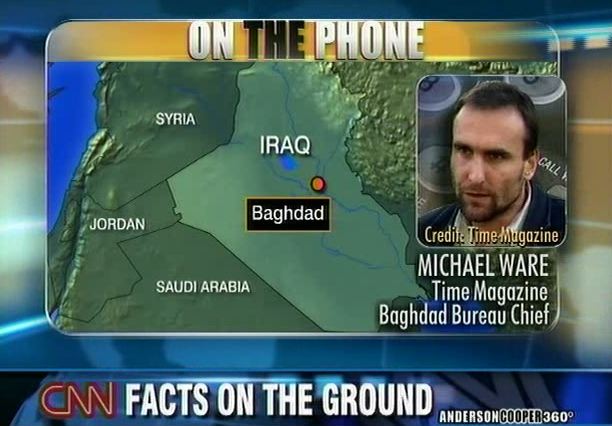AC: What really happened at Tal Afar?

Length: 3:59
LARGE (46.6 MB) ----- SMALL (4.6 MB)
ANDERSON COOPER: The president went into great detail about the capabilities of the Iraqi security forces, in particular, saying the recent battle of Tal Afar was a sign of how strong the Iraqi military has become. The president says Iraqi forces led that battle, but our next guest remembers it very differently.
He was there on the front lines and says Iraqis fought, yes, but they certainly didn't lead.
Michael Ware is "TIME" magazine's Baghdad bureau chief.
I talked to him earlier.
(BEGIN VIDEOTAPE)
COOPER: So, Michael, the president made a point today to come out and say that the Iraqis, the soldiers, those who are being trained are better than they have ever been doing before. What's your assessment?
MICHAEL WARE, BAGHDAD BUREAU CHIEF, "TIME": Well, they might be doing better than they have ever done before. But I have to tell you, that benchmark is not set very high.
I have been in combat with, I can say with some confidence, every type of Iraqi security force there is. These guys are a long way from ready. I mean, in fact, I have had a very senior officer here in Baghdad say to me that there's never going to be a point where these guys will be able to stand up against the insurgency on their own.
COOPER: One of the things that Army General George Casey had said back in September, that there is only one Iraqi unit that's at a level-one readiness. Level one is fully capable of maintaining operations on their own.
What the president today is, he said -- quote -- "Now there are over 120 Iraqi army and police combat battalions in the fight against the terrorists."
There's a big difference between being in the fight against terrorists and being fully combat ready.
WARE: Oh, absolutely.
And really, what so many of these forces are, are just numbers on paper. These are guys who have been churned out in a three-to five-week training session, where they become familiar with shooting a Kalashnikov rifle and learn how to do basic patrolling.
Then they're wrapped in a uniform and they sit on a street corner or a checkpoint or actually go out on raids. And these guys, the traditional Iraqi culture is that you spend as much time at home you as you possibly can. So, if these are troops who are far from their home base, they spend weeks every month traveling to and from their home cities. So, these guys are getting very little real training.
COOPER: The president said 80 Iraqi battalions are fighting side by side with coalition forces, and about 40 others are taking the lead in the fight. The soldiers, the American soldiers, who you have spent so much time with, do they have confidence in the Iraqis who are apparently taking the lead in this fight or standing side by side with them?
WARE: By and large, no, not at all, Anderson.
I mean, there's some units that they have performed better than others. There's other occasions where an American unit and their counterparts develop a very particular rapport. But, otherwise, no -- the American soldiers can really have very little faith in their Iraqi comrades.
I mean, I was in a battle just two weeks ago where some of the Iraqis refused to fire when we came under attack. This is a man who, in the face of an attack, just puts down his weapon and curls up in a ball. I mean, I have seen that on many, many occasions.
COOPER: The president also said today that, in the battle of Tal Afar, the assault in the north of Iraq, that he said it was led primarily by Iraqi security forces, 11 Iraqi battalions, backed by five coalition battalions providing support.
WARE: With the greatest respect to the president, that is completely wrong and is extraordinarily misleading.
COOPER: How do you know that?
WARE: I was in that battle from the very beginning to the very end.
I was with Iraqi units, right there on the front line, as they were battling with al Qaeda. They were not leading. They were being led by the U.S. Green Beret special forces with them, Green Berets who were following an American plan of attack, who were advancing with these Iraqi units as and when they were told to do so by the American battle planners. The Iraqis led nothing.
(END VIDEOTAPE)
COOPER: A very different view from the president's speech.
